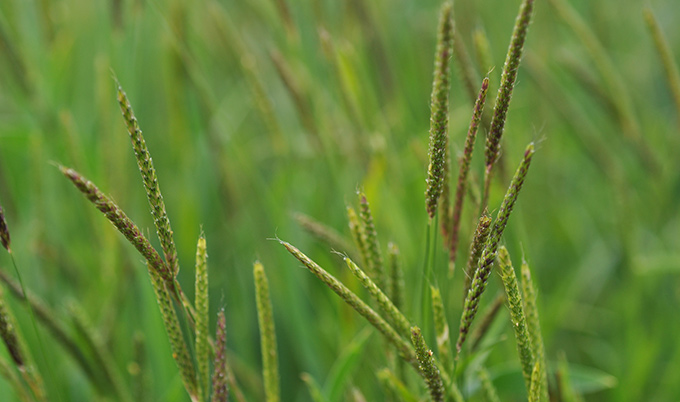Blackgrass
One-step test for the detection of herbicide resistance in blackgrass
Published on: 13 June 2018
Newcastle University and Mologic launch pioneering new diagnostic for black-grass resistance at Cereals 2018
A ‘pregnancy-style’ test which can be used on the farm to quickly detect the presence of herbicide resistance in black-grass is being launched today by Mologic Ltd, a developer of personalised diagnostics, and Newcastle University.
Sensitive enough to detect resistance in the early stages of blackgrass growth and giving a result in under five minutes, the new Black-grass REsistance Diagnostic tool – BReD – allows farmers to map non-target site herbicide resistance in populations of black-grass across the farm, giving rapid feedback on the effectiveness of weed control measures.

Two decades of research
BReD works by detecting the glutathione transferase AmGSTF1 - a protein that is found in high concentrations in black-grass populations that have evolved resistance to multiple classes of herbicide.
When the protein is present, an intense red band appears in a small window on the hand-held device within five minutes.
Founded on 20 years of research into the chemical control of this weed led by Professor Rob Edwards at Newcastle University, BReD has been developed as a new tool in the armoury to slow the spread of the UK’s most devastating weed.
Research lead Professor Rob Edwards, Professor of Agriculture at Newcastle University, explains:
“Early-indication diagnostic tests are common place in medicine, such as for pregnancy or diabetes, and are used to help people make decisions much earlier on with the aim of improving the long term outcome. It should be no different in agriculture.”
“This new diagnostic tool marks an important step in our fight against resistance, using the latest research to deliver solutions in crop protection.”
“It is an approach we have termed ‘personalised agriculture’, and BReD represents the first in a series of diagnostics we are working on to counteract resistance and emerging disease in the agricultural setting.”
World first in on-farm technologies
Mitch Brooker, General Manager at Mologic adds:
“Mologic has a proud history in forming lasting partnerships with both academic and commercial organisations. We are excited to bring BReD to the field as this is the first non-IVD product to be taken from development through to manufacture and commercialisation by our team. Mologic plans to advance towards extending its portfolio of innovative agricultural diagnostic devices.
“Working with Prof Edwards and his colleagues at Newcastle University has provided access to pioneering research, which when combined with our innovative lateral flow technology has enabled us to deliver BReD, a world first in on-farm technologies, giving agronomists and farmers a real measure of the degree of non-target site herbicide resistance in their blackgrass populations and enabling the farm to make informed decisions.”
Number one problem weed in the UK
Blackgrass is now the number one problem in weed control for UK growers, with multiple herbicide resistance being a major problem leading to losses in national wheat production estimated at £0.5 billion a year.
At the moment, the only way of knowing if black-grass sampled in the field is resistant is to send seeds or plants off for herbicide screening, resulting in delays in making informed decisions about control options.
Funded by the Biotechnology and Biological Sciences Research Council (BBSRC) and the Agriculture and Horticulture Development Board (AHDB) the underpinning science for BReD has been developed by scientists at Newcastle University, as part of the Blackgrass Resistance Initiative, a partnership with Rothamsted Research, Sheffield and York Universities and the Institute of Zoology. BReD will be officially launched at Cereals 2018 by Mologic, who have been the commercial partners in developing the product for the last 2 years.
Spread of Black-Grass
Black-grass arrived in the UK with wheat and barley during the Bronze Age but was not considered to be a major weed until the late 1980s.
Herbicide resistant populations of black-grass have been confirmed in many countries and are now widespread in England and increasing in France and Germany.
Herbicide resistance is inherited and occurs through selection of plants that survive herbicide treatment. With repeated selection, resistant plants multiply until they dominate the population.
“It’s like a plague - the resistance is creeping up the country and our first line of defence, herbicides, are becoming less effective, just like antibiotics in medicine,” explainsProfessor Edwards, who is Director of the Institute for Agri-Food Research and Innovation (IAFRI), a joint venture between Newcastle University and Fera Science Ltd (Fera).
“And just like in medicine where researchers and clinicians are working side-by-side to come up with new solutions, in agriculture we need to be doing the same.”
To find out more about Mologic visit: https://www.mologic-bred.co.uk
Number one problem weed in the UK



